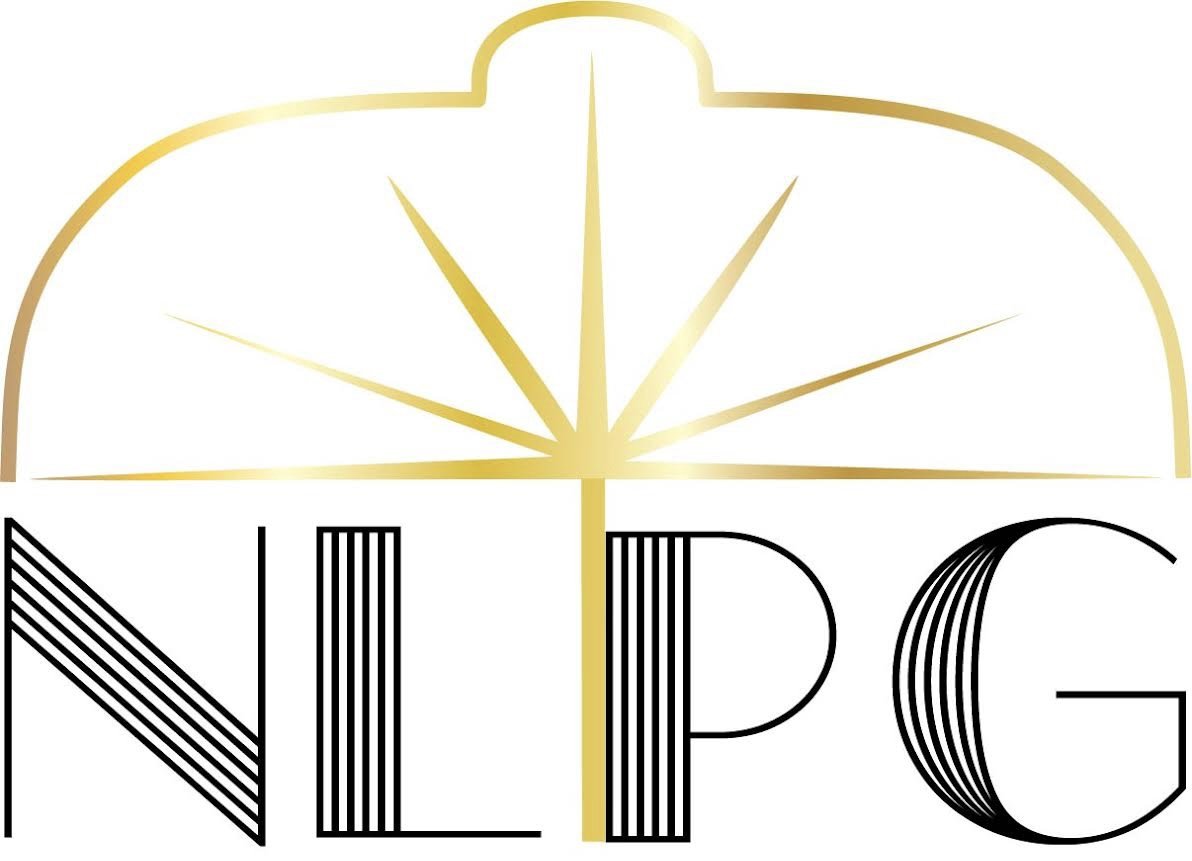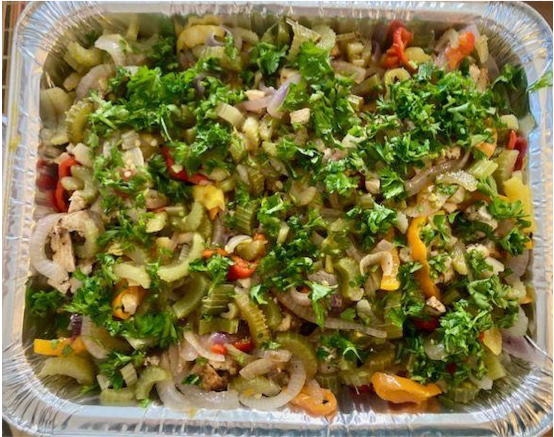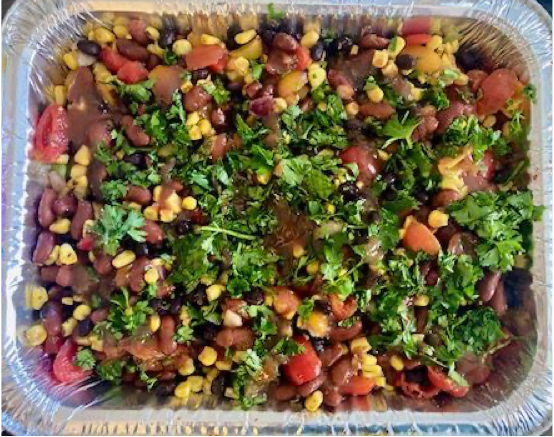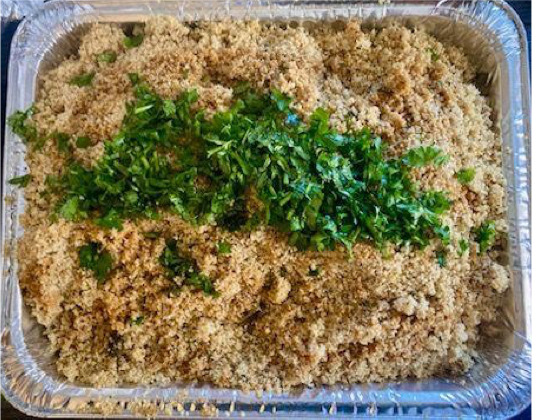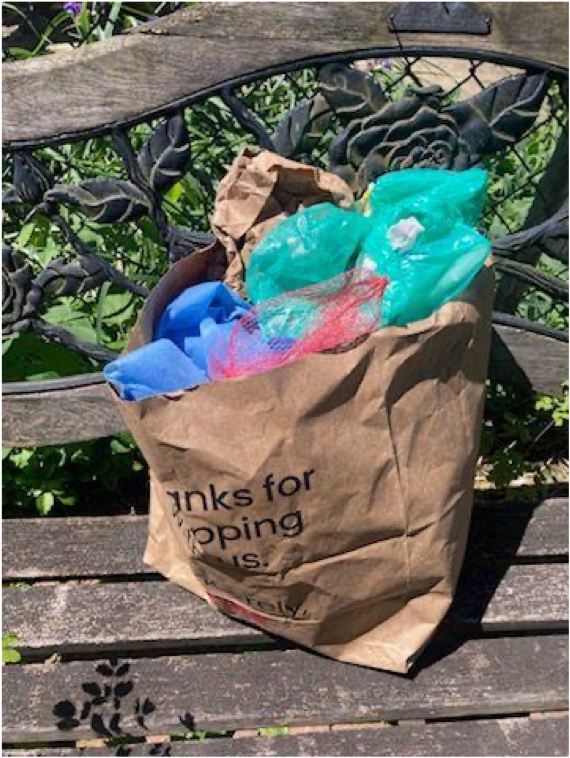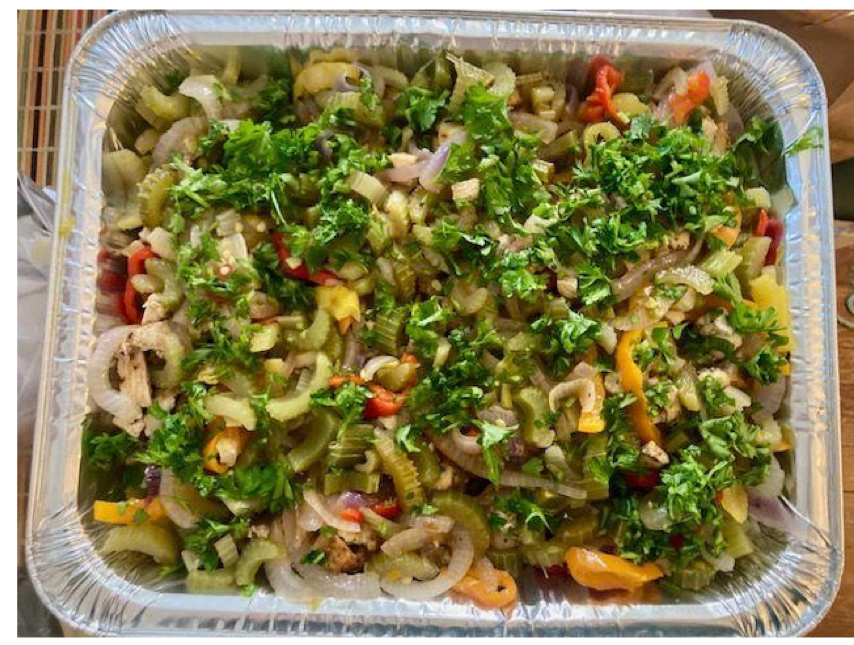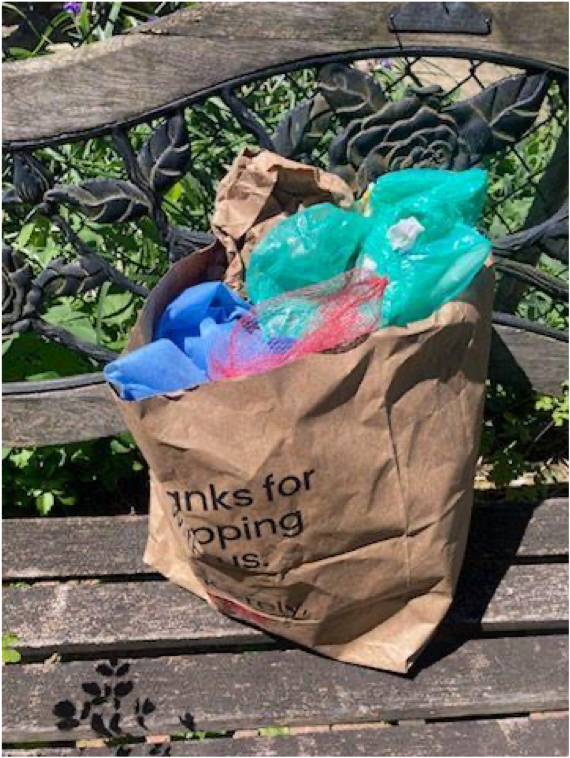Vegan Visions: Nourishing the Soul of the Community
BY ZAKIYYAH CHEF ALI
CULINARY ARTIST’S BIO
Zakiyyah Ali is a member of the Board of Directors of Next Level Publications Group, Inc., the publishers of KIZA BlackLit. Sister Zakiyyah Ali has been a natural gardener, vegan chef and caterer for over 40 years, and recently unearthed her talent as a ceramic artist. She is the founder of Ali’s FACES, promoting healthy Food, Agriculture and Environment through consulting services. Her podcast, Urban Islanders, has provided environmental education on location in Philadelphia, Iowa, Maine, Vermont, New Jersey and New York.
As a vegan chef, Sister Zakiyyah had a key role in mainstreaming veganism, creating dishes popular to the most die-hard steak-and-potatoes diners. Her tables at annual Odunde celebrations have drawn visitors from around the country. A native of Philadelphia, she has fed the community in the City and around the world, including Jamaica, Ghana and China. Winnie Mandela, the Roots musical group, Kofi Asante, Molefi Asante, Ziggy Marley and Aris Latham of Sunfire Foods, are among the well-known people who have sat at her table.
Sister Zakiyyah takes the greatest pride in feeding and teaching the community at large, including elders and prison groups, in order to enhance the overall health, longevity and consciousness of the Black community. She educates youth through adults in healthy eating, principles and practices of veganism, culinary entrepreneurship and gardening. She often serves dishes and creates herbal tonics with vegetables freshly harvested from her chemical-free gardens. In this edition, we are pleased to share Sister Zakiyyah’s energy, enthusiasm and vision for a healthy, well-nourished community. Also, enjoy a few of the clay sculptures she has created.
Vegan Visions: Nourishing the Soul of the Community
© 2024
We’ve heard the quote from the Bible that says, “Behold, I have given you every herb and seed and for you, that shall be your meat.” Hearing that at a young age, being brought up in the Baptist Church, I heard it, but I didn't really understand and take it to heart, or really delve into what that was saying. As I got older, I started looking at religions and ways of life and getting my adult principles established.
I looked into The Seventh-Day Adventists and Jehovah Witnesses and various other Christian denominations. Then I looked at Moorish Americans and Islamic people. It wasn't until I got a lesson at the mosque on Staten Island, New York that things really began to click for me. The speaker broke down the categories of animal life: bovine, reptile, fowl, canine, etc. And he talked about the creation of the pig and why we shouldn't eat it, because of his constitution and make-up.
This brought me back to the whole idea of “Behold, I have given you every herb and seed.” So in reading How to Eat to Live, by the Honorable Elijah Muhammad, peace and blessings of Allah be upon him, he mentioned that some of us may get to be vegetarians. That wasn't something he prescribed, but was one of the things that he mentioned.
By the time I was in high school, I began to have an itch for dealing in the culinary arts, and the lessons I was getting began to take root. I gave up pork in junior high school. I wasn’t a big fan of beef and lamb, and seafood didn’t interest me. I did like fish—red snapper, flounder and such. As time went on, I got more into the understanding of diet and the body and the whole concept that I'm not going to kill anything to eat. The transition was really kind of quick for me, in terms of becoming a vegetarian and then a vegan and then a raw food person.
At each level of study, my awareness heightened about the connection between the body and what you eat. For some things, you have to “live it,” to know if they make a difference or if it has an effect. As I have lived, I’ve gone through very few medical issues. I’ve had some medical emergencies—I was attacked by a dog and I was hit by a car. In recovering from those emergencies, I recognized that my diet and mindset helped me to deeply heal and to regenerate.
I’m talking about a 30- to 40-year process, moving and traveling, ang getting back to, “Behold, I have given you every herb and seed.” As a traveler to different parts of the world, I have seen so much vegetation and food that we as Americans don't even consider or think about, because it's not what we have been trained to eat or even to think about as food. Being a vegan, I'm experimental, and because I am a chef, I know how to make a lot of things. There's such a wide range of nuts and seeds and herbs and grasses and greens and plants that we're really missing when we don’t investigate or become curious about trying different foods.
One of the first understandings that came to me was that we need to eat foods that are colored. People say, “Why should I eat foods that are colored?” Well, our organs are colored. They’re not black and white and gray or red or pink. We melanated folks need those colors to help highlight and accent and trigger the melanin, for it to be activated to its highest sense.
That speaks to vibrations and frequencies. Food has frequencies, vibratory rates that can impact how your energy is, how your attitude is. Maybe even how your aptitude is. I don't want to go that far. But, I think it all plays together, because we're dealing with mind, body, spirit and energy.
If you eat food of a high energy or high frequency, like drinking coconut water, eating live foods or a nice salad. Eating legumes, like lentils. Of course, preparation makes a big difference. You don't want to fry and deep fry everything in a lot of grease. Because, again, it's what you eat that makes up who you are and how you think and how you move. Our organs need a chance to rest and relax. And the best foods provide the nutrients—minerals, amino acids and so forth. Unfortunately, the American diet as it is prescribed does not really give the human body what it needs.
They say you can eat processed, and all this newfangled food, and still meet the nutritional balance that the body needs. I don't really buy that, because I'm looking at the byproducts that these things give people: high blood pressure, diabetes, high cholesterol, obesity. You name it, all kinds of issues. They say you get your nutritional value, but look at all the illnesses that go along with it.
Sometimes people make it seem as if something else makes the body. It goes back to the building blocks that your parents, mom, grandmom gave you. You’ve got to eat your vegetables, different colored vegetables, some type of protein. We tend to not understand the building blocks of the body. Then, prematurely, we start feeding children or allowing children to eat things that their systems really can't digest, things that aren't the best for the long-term health and betterment of the child. They shouldn't be eating hot sauce at two and three, and shouldn’t be drinking sodas. We perish, or we suffer from a lack of proper information.
For me, eating is partly about morals and principles and values. The way people eat speaks a lot about how they think about life and the environment. I'm not faulting or criticizing. I think that people just don't know. We've been seduced, for lack of a better word. We've been seduced into thinking that all of these things are good for us. Veggie burgers that have never seen a vegetable, doughnuts, every new fast food sauce and new drink. We seem to think we just have to have it. Maybe people do, I don't know. I think it’s best to be more conscious about what we're ingesting and aware of the byproducts of these products.
As it stands, the food industrial complex has taken over. A lot of our food is being grown in hot houses, and under a lot of chemicals and artificial light. It's not getting fresh air and sunshine anymore. I do use hydroponics and other alternative food production on a small scale. When you go to large scale, I think there will be some problems, because of what you have to feed the plants and which you have to do to maintain production. It’s just about being conscious of what you eat.
I’m 71 this year. I don't have, and I never had, high blood pressure or diabetes or obesity, heart issues or any of the things that the basic African-American woman is usually having at this age. I'm really grateful, and I attribute my health to the way I have eaten over these years. I fast, partly to give my body the rest that it needs. I fast with different herbs or, on occasion, just eat fruits for a few days.
Eating seasonal and regional foods, and foods that one grows, is powerful. I'm a farmer, and that has influenced my understanding about how and why you should eat. There's nothing greater than to go to a garden and be able to pick all of your salad ingredients fresh. Talking about vibratory rates and frequencies! That's one of the highest you can get right there, as long as you don't drown it in a bunch of dressing and sodium and fat. Fresh-picked fruit made into a fruit salad is just pure energy.
I like to use fresh herbs in my cooking. Oregano, basil, thyme, parsley, cilantro, any fresh herbs that I can find to complement the vegetables or fruit. The fresh ingredients talk to me, and tell me how they want to be prepared. For example, one day a friend asked me to come cook for her family and an event.
On the menu were two kinds of kale. The dinosaur kale was going to be a salad and the curly kale was to be cooked. Well, as I got in the kitchen and started prepping everything, the kales were like, no, that's not what we want to be. It was like they had a conversation between the two of them or something like that. They told me to switch that around.
It happens a lot. I’m mentioning just a couple of times when the food really made me laugh. One time, I had my garden around August or September. We had all kinds of yellow and organic heirloom tomatoes with stripes and red ones, and peppers. I went to someone's house to cook, and walked into a house full of people. We were like, should I make a stew or what?
Now, the order that you put things in a pot makes a difference in the outcome. After everything was cut up and prepped—onions, peppers, celery, tomatoes, it was like, what are you going to put in the pot first? Well, the tomatoes kind of spoke up, “We want to be first, we want to be first!” We ended up with this beautiful sauce from the yellow and red tomatoes. Some of them broke down and some of them stayed firm. Then the onions and peppers went in, and this marvelous stew formed. So yeah, sometimes the food will tell you, or it’s the aroma. Different things will hit your senses.
I have had the honor and great joy of feeding a lot of people over the years. Unfortunately, a lot of people will remain nameless, because I just don't know who they are. I have a picture of me holding a serving tray behind Winnie Mandela when she visited Philadelphia. She was the guest of the Black Women's Political Congress, and Mrs. Mandela wanted to have a meal in someone's home, not at the restaurant in the hotel. I was able to be part of catering that event.
I fed some of Bob Marley's crew. Rita and some of the boys used to come to the festival over in Wilmington, Delaware during the early years. I fed The Roots group when they were new guys on the block, and Mutabaruka at the East Carnival. I used to do a lot of food with the Move Organization, and to that end, I fed Geronimo Pratt, Catherine Cleaver, Ramona and Pam Africa, most of the Africa family over the years. Also, at Temple University, Molefe Asante and his wife, Kariamu Welsh and their son when he was young. Ras Ben, a native Philadelphian and gemologist, and his family, Cecil Gray. I’ve fed Dick Gregory at the Locs Conference, an annual event that has been maintained for quite a few years here in Philadelphia.
I went to the Odunde Festival this year, just as a community person, and I gave out watermelon and water to the drummers and some people. We were honored that we were able to celebrate the festivities. Even though we weren't there in a full-blown vendor situation, we could still be of service to the community. One of the things that I have learned over the years is that many of our people have health issues, and we also have financial issues, so sometimes we don't always have money to have the adequate things that we need, like just a bottle of water, or something a little refreshing to eat, a small slice of watermelon. Those things can make a difference in somebody having a heat stroke or going into some type of diabetic situation. Someone may need food to take with their medicine.
I have found it a wise practice to always be able to offer people something. Yes, I'm in the food business and I should be making money. Sometimes it's not about the numerical or financial money. Someone told me one time that I was storing stars, or something like that, in heaven. I don’t remember her exact words. It was like I’m putting my value in another kind of bank. I said, ok, I can go for that.
/ / / / / / /
Baked marinated tofu with sauteed onions, celery, mixed peppers, onions, parsley and cilantro
Bean salad with fresh heirloom tomatoes, black beans, kidney beans, corn, onions, assorted colored bell peppers, date & tamarind chutney, chili sweet & sour sauce
Couscous w parsley, cilantro, fresh mint
Just one brown paper bag of trash was generated from preparing food for 60 people. Vegetable peelings and scraps that went into the garbage disposal. A few cans went to recycling, and that was it.
/ / / / / / /
